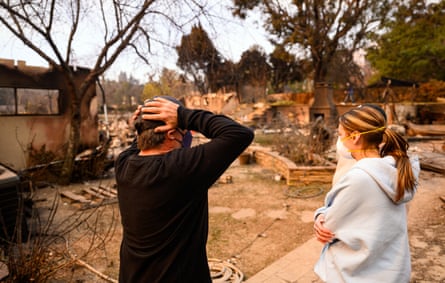Mayra Chacon’s home cleaning service, Ocean Housekeeping, employs Guatemalan and Mexican immigrants who arrived in the US less than six months before. They clean dozens of houses around Los Angeles and, every Saturday, send their paychecks to loved ones back home.
But as wildfires erupted earlier this month, Ocean Housekeeping lost more than 50% of its business overnight. Fires burned down 25 homes in the Palisades that Chacon’s company cleaned on a weekly basis, and 10 homes in Altadena and Pasadena. Her employees speak little English and don’t know how to find work elsewhere, Chacon said. With the plunge in revenue, she’s offering a 25% discount to new customers so she could book more jobs to keep everyone paid.
“At this point”, Chacon said, “it’s not only my family but 10 more families I have to look out for.”
The deadly wildfires that swept across LA county have scorched more than 40,000 acres of land and killed 25 people as of Friday. The Palisades and Eaton fires destroyed more than 10,000 structures, including multimillion-dollar homes where thousands of house cleaners, gardeners, nannies and caregivers worked day and night to pay bills and provide for their families.
Domestic workers and day laborers, who are predominantly immigrants, face unique burdens during wildfires because their jobs are often paid by the day and offer few social protections, said Maegan Ortiz, executive director of Instituto de Educacion Popular del Sur de California (IDEPSCA).

“Every day that the fire is going on is a day without work,” Ortiz said, adding that many workers are ineligible for public benefits because they are undocumented.
There are more than 100,000 domestic workers in LA county, roughly one-third of the state’s total workforce, according to a 2020 study from UCLA. The vast majority are immigrants and women of color from Latin America and the Philippines. In 2020, IDESCA investigated the impact of the 2018 Woolsey fire, which destroyed more than 1,600 structures, on domestic workers in Malibu. More than half of the nearly 200 workers surveyed reported permanently losing their jobs in the affected area. Many dealt with the financial and emotional fallout of the fires for at least two years.
“That’s just one fire in one area,” Ortiz said. “Once all these fires are contained, what is going to be the long-term plan for essential workers?”
IDEPSCA is in regular contact with roughly 5,000 domestic workers in the greater LA area. Nearly half were houseless before the fires, Ortiz said, and that rate is likely to increase in the coming weeks. Already, 75 household workers have called the organization to report job loss, and there is still a backlog of calls to be processed.
Amit Mohan, who operates his own plumbing service, lost more than 80% of his business after the Palisades fire, including more than $20,000 worth of jobs over the next couple of weeks.
Mohan said the plunge in income means he will have to pay for rent and other bills with his savings, which are not flush. But he’s more concerned about the dozens of Palisades homeowners he has become friends with over the 30 years he’s worked for them. He began crying as he recalled a conversation with an elderly customer who saw his house resting in ashes.
“It’s a hard pill to swallow,” Mohan said. “There are a lot more people out there that need more help than I do.”

Wildfires “exacerbate long-standing inequities” for Latinos and people from other underserved communities, as they are disproportionately employed in fields like agriculture, construction and landscaping, according to a study published Monday by the UCLA Latino Policy and Politics Institute. Residents in Latino neighborhoods are three times as likely to be employed in these sectors as their counterparts in white neighborhoods. Exposure to wildfire smoke puts workers at increased risk of respiratory illness and economic disruptions.
Bryan Yepez, who runs a landscaping business with his father and uncle in Altadena, said the family may soon have to let some workers go, as the Eaton fire has burned down nearly half of the homes they regularly serviced. Yepez also has had to cancel other appointments at homes that are out of the burn zone due to hazardous conditions.
“There’s a lot of ash on the ground so we can’t use leaf blowers,” he said, “and the chemicals going around are pretty bad”.
For labor organizers, the fires highlighted the urgency to enact stronger protections for low-wage essential workers, such as hazard pay, unemployment compensation and healthcare benefits.
“We’re really looking to ensure that recovery isn’t all just about relief,” said Megan Foronda, a certified nurse assistant and community organizer with the National Alliance for Filipino Concerns (Nafcon).

Many Filipino caregivers have lost their job and home, she said. Others helped evacuate their patients and continued to work in hotels without proper medical equipment. Nafcon organizers have reached out to between 300 and 400 Filipino caregivers and service workers who have been affected by the fire, distributing relief kits and conducting door-to-door wellness checks.
Grassroots groups have had to organize for aid, Foronda said, because not many caregivers and essential workers qualify for Fema assistance, which is reserved for people whose homes burned down. “We’re trying to show people that this is a very narrow definition of who’s directly affected by the fire,” Foronda said.
In the meantime, non-profits and local activists have launched fundraisers to support essential workers suffering from financial hardship. The economic justice group Inclusive Action for the City created an emergency fund for outdoor workers, such as street vendors and landscapers. The money will be distributed as one-time cash payments of $500 on a first-come, first-service basis. The National Domestic Workers Alliance is collecting donations to buy PPE and basic living supplies for workers, and to fund their long-term recovery support.
“We’re seeing the wildfires affect so many of us in LA,” Foronda said. “Grassroots efforts show that we have a lot of power when we do come together.”

.png) 3 months ago
43
3 months ago
43













































